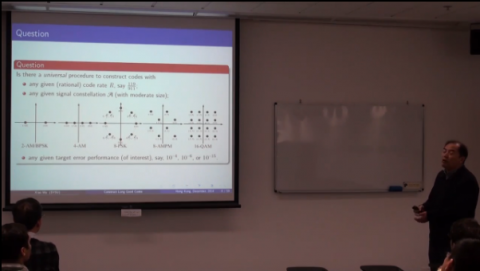
In this talk, we are trying to answer a question: Is there any universal procedure to construct (decodable) good codes over any given alphabet (with moderate size) for any given (rational) code rate to achieve any given target error performance (of interest). We are primarily concerned with codes over additive white Gaussian noise (AWGN) channels albeit generalization to other ergodic channels is possible. Without loss of generality, we can assume that the considered signal set is a finite group. We start with constructing codes over groups for any given code rates. This can be done in an extremely simple way if we ignore the error performance requirement for the time being. Actually, this can be satisfied by repetition (R) codes and single-parity-check (SPC) codes along with time-sharing technique. The resulting codes are simply referred to as RSPC codes for convenience. The encoding/decoding algorithms for RSPC codes are almost trivial. In addition, the performance can be easily analyzed. It is not difficult to imagine that an RSPC code usually performs far away from the corresponding Shannon limits. Fortunately, the performance can be improved as required by transmitting repeatedly codewords in a block Markov superposition mode, resulting in BMST-RSPC codes. A distinguished feature of the BMST codes is the simple relation between the asymptotic coding gain and the encoding memory, which is critical for deriving the universal procedure to design a good BMST-RSPC code at any given target error performance. Simulation results show that the BMST-RSPC codes perform well (within one dB away from Shannon limits) over a wide range of code rates.
Xiao Ma is a Professor with the Department of Electronics and Communication Engineering, Sun Yat-sen University, Guangzhou, China. He received the Ph.D. degree in communication and information systems from Xidian University, China, in 2000. From 2000 to 2002, he was a Postdoctoral Fellow with Harvard University, Cambridge, MA. From 2002 to 2004, he was a Research Fellow with City University of Hong Kong. Dr. Ma’s research interests include information theory, channel coding theory and their applications to communication systems and digital recording systems. Dr. Ma is a co-recipient, with A. Kavcic and N. Varnica, of the 2005 IEEE Best Paper Award in Signal Processing and Coding for Data Storage. In 2006, Dr. Ma received the Microsoft Professorship Award from Microsoft Research Asia. Dr. Ma is a member of the IEEE.
